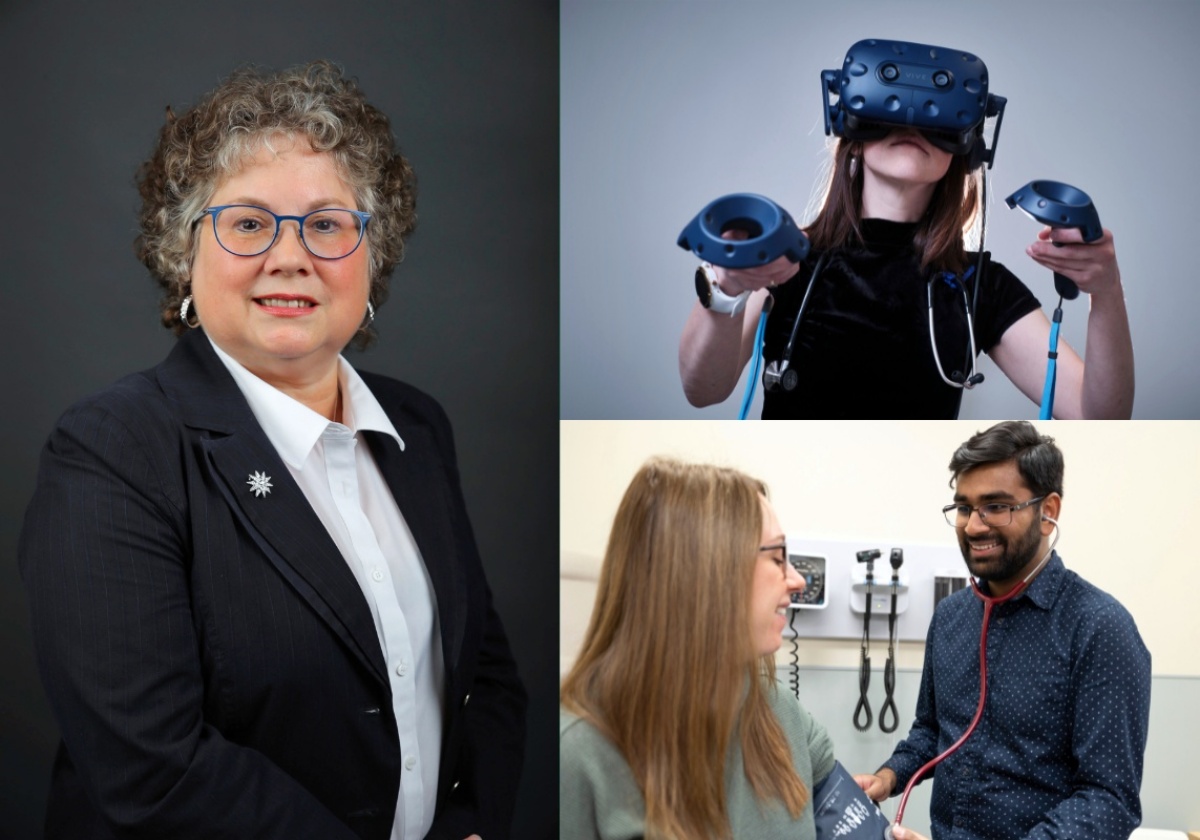
USask College of Nursing intensifies research focus
As part of its Plan 2025 strategies, the USask College of Nursing is expanding its research impact.
By Elizabeth IrelandNursing is a rapidly changing profession and research is an important way to incorporate the patient experience into future health care.
The College of Nursing at the University of Saskatchewan (USask) is highly committed to the university’s intent to “be the university the world needs.” As part of its Plan 2025 strategies, the USask College of Nursing is expanding its research impact — focusing on research that will drive improvements in health-care practices, especially around primary and patient-centred care.
With more than 1,030 undergraduate students, 240 graduate students and 10,900 alumni, the College of Nursing has a large scope. Currently, 16.5 per cent of students have self-declared as Indigenous. Plus, the College offers a variety of graduate programs for registered nurses to keep learning and advance their careers.
Dr. Louise Racine is the College of Nursing’s associate dean, research and graduate studies. A registered nurse herself, Racine earned her BSc and MSc in nursing from l’Université Laval and her PhD from the University of British Columbia.
Racine has been a faculty member at USask for 18 years and she has taught both undergraduate and graduate courses. Her own academic research delves into immigrant, refugee and Indigenous health, cultural safety, marginalized populations and providing better health outcomes.
“I’m interested in how nursing and health issues intersect with race, gender and social class to affect equitable access and use of health care services,” says Racine.
Racine describes the College’s Master of Nursing Primary Health Care Nurse Practitioner degree as its “flagship graduate nursing program.” She says that the nurse practitioner program has a large number of applicants from across Canada and applications keep increasing each year.
“The internationalization of our graduate programs is aligned with the mission and vision of the University of Saskatchewan,” says Racine.
Nurse practitioners are advanced practice nurses who use clinical skills associated with nursing and medicine to assess, diagnose and manage patients in primary care and acute care settings. Nurse practitioners can also work in communities to provide care for patients with chronic illness on an ongoing basis.
Conventional wisdom is that having more nurse practitioners on staff improves patient access to primary health care and reduces overall pressures on a health-care system.
With a laser-sharp focus on research, the College has three signature research areas based on the strengths it has identified. These are innovations in health systems and education; community-engaged health and nursing research; and health equity research.
Innovations in health systems and education research include rural and remote nursing practice, virtual reality as a teaching strategy, enhancing health service delivery and the history of health systems. For example, assistant professor Dr. Don Leidl’s research dives into the potential of virtual reality for health-care service delivery — as a teaching strategy in nursing and as a patient education tool.
“We are proud of our research into virtual reality and the other extremely innovative work of our faculty,” says Racine.
Community-engaged health and nursing research topics include mental health and well-being, addressing health inequities, substance use prevention and dementia patient care. Associate professors Drs. Jill Bally and Shelley Spurr are examining resiliency and wellness among Indigenous and Metis populations living with type 2 diabetes. Particularly after the difficult years of the COVID-19 pandemic, these topics are top-of-mind for many people.
Health equity research topics include equal partnership in health care, pediatric pain and palliative care, improving immigrant, refugee and Indigenous health and wellness, food security and quality housing (especially in rural and remote communities). In many ways, Saskatchewan is an ideal province to research health equity and patients with more complex problems.
USask’s Prince Albert campus increases opportunities for students to access learning in a city that often serves as a gateway to northern Saskatchewan’s rural and remote communities. The College of Nursing is one of the few USask faculty that offers a full program out of the Prince Albert campus.
The Prince Albert campus also acts as a research base for some faculty members. For example, associate professor Dr. Geoffrey Maina focuses on health and social priorities and community driven interventions to address health disparities. Also in Prince Albert, assistant professor Dr. Sithokozile Maposa is doing research focused on Indigenous women’s health.
As Canada experiences a shortage of nurses in community and hospital settings, nurses are faced with solving complex transdisciplinary problems that impact the health of patients and communities. “I’m proud of the work we are doing and look towards a bright future,” concludes Racine.
This story originally appeared in the Saskatoon StarPhoenix National Nursing Week Feature on May 9, 2023.
Together, we will undertake the research the world needs. We invite you to join by supporting critical research at USask.

